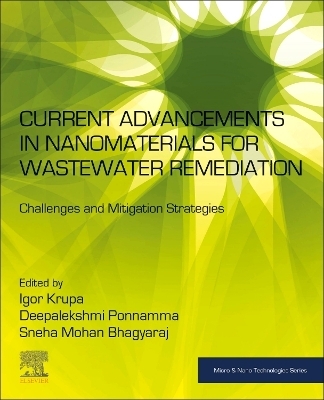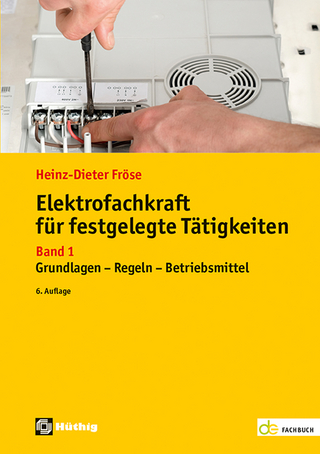
Current Advancements in Nanomaterials for Wastewater Remediation
Elsevier - Health Sciences Division (Verlag)
978-0-443-16112-4 (ISBN)
- Noch nicht erschienen (ca. Mai 2025)
- Versandkostenfrei innerhalb Deutschlands
- Auch auf Rechnung
- Verfügbarkeit in der Filiale vor Ort prüfen
- Artikel merken
Prof. Igor Krupa is Professor and QAPCO Polymer Chair at the Center for Advanced Materials, Qatar University, Qatar. His research interest includes various aspects of polymer science and technology, particularly focused on polymeric blends and composites, electrically and thermally conductive composites, membranes and sorbents for water purification, phase change materials, sol-gel technology and modifications of polymeric surfaces. As an industrial company Chair, he has long term experience with industry cooperation, specifically dealing with polymers’ technology and processing, and chemical modifications of polymeric materials for various industrial applications (sorbents, foams, packing materials, textile). He is the author or co-author of more than 150 scientific papers in peer-reviewed journals, six chapters in books and one patent. He has presented over 100 lectures at international conferences. He is a participant in various national and international research projects in the field of polymers, nanotechnology and composites. Dr. Deepalekshmi Ponnamma is a Lecturer in Materials Science and Technology, at the College of Arts and Sciences, Qatar University. She is a PhD graduate from the Deakin University, Australia, and finished the post-doctoral studies from Qatar University. She has a research experience of more than 10 years with special focus on polymer nanocomposites and various nanomaterials. Dr. Ponnamma has more than 100 research articles published in international peer reviewed journals. She has contributed around 20 book chapters and edited 9 books, all focusing on the various fabrication methods and applications of nanomaterials and polymer nanocomposites. For the past three years, Dr. Ponnamma has been working on synthesizing the different nanoarchitectures, polymer nanocomposites and block copolymer membranes for efficient technological applications such as energy storage, environmental applications including photocatalysis and water purification. Dr Sneha Bhagyaraj is a researcher assistant in the Center for Advanced Materials, Qatar University, Qatar. She did her PhD in Chemistry with specialization in Nanomaterials from Cape Peninsula University of Technology together with International and Interuniversity Center for Nanoscience and Nanotechnology, Mahatma Gandhi University, Kottayam, India. Her research interest includes various aspects of polymers and nanomaterials synthesis and application including sensing, catalytic activity and water purification.
1. An overview of water quality, water pollutants and importance of nanomaterials in water remediation
2. Water pollution: sources, causes and effects
3. Recent advances in offshore and onshore water quality monitoring
4. An overview of produced water, its environmental impacts and treatment techniques
5. Recent advances in oil/water emulsion separation
6. Bionanomaterials based water remediation techniques
7. Recent advances in membrane technology for water purification
8. Recent advances in 2D nanostructures-based water treatment techniques
9. Recent advances in 3D nanostructures-based wastewater treatment
10. Photocatalytic approach for wastewater treatment
11. Microbial assisted water remediation for toxic contaminants
12. Biowaste derived wastewater treatment technologies
13. Recent advances in chemical and physical approaches for wastewater treatment
14. Carbon based materials for wastewater remediation
15. Nanotechnology assisted heavy metal removal from water
16. Advances in polymer nanocomposites-based structures for water remediation
17. Role of chemometrics in wastewater treatment
18. Recent developments in brine water treatment
19. Advancements of Pickering emulsions for oil recovery
20. Commercial nanomaterial products for wastewater remediation: journey from lab to industrial application
21. Challenges, limitations, bottlenecks of wastewater treatments and their potential solutions
| Erscheint lt. Verlag | 1.5.2025 |
|---|---|
| Reihe/Serie | Micro & Nano Technologies |
| Verlagsort | Philadelphia |
| Sprache | englisch |
| Maße | 191 x 235 mm |
| Themenwelt | Technik ► Elektrotechnik / Energietechnik |
| Technik ► Maschinenbau | |
| Wirtschaft ► Volkswirtschaftslehre | |
| ISBN-10 | 0-443-16112-7 / 0443161127 |
| ISBN-13 | 978-0-443-16112-4 / 9780443161124 |
| Zustand | Neuware |
| Haben Sie eine Frage zum Produkt? |
aus dem Bereich


